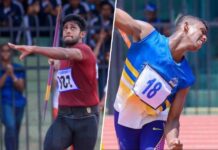
The World Anti-Doping Agency (WADA) was aware of systematic doping in Russia for years but did nothing until a documentary jolted the agency into action, a former Russian Anti-Doping Agency official told CBC.
Vitaly Stepanov and wife Yuliya, an international runner who was banned for doping, were the whistleblowers who provided key evidence for a German television documentary that led to the establishment of a WADA independent commission.
Now in hiding, Vitaly told the Canadian Broadcasting Corp in an interview that aired on Wednesday that in 2010 he secretly began sending details to WADA about how Russia’s doping system functioned.
With no action being taken by WADA, Vitaly said he was told by an unnamed official at the agency that the best advice he could provide was to go to the media.
“Of course both of us were frustrated at some point because we just didn’t know if anything was happening, like even at WADA there were people who did not want this story to get out,” Stepanov told CBC.
WADA did not immediately respond to a request for comment.
Vitaly’s frustration reached a boiling point in 2013 when he says his wife was used as pawn and returned a positive test so the Russian anti-doping agency would appear to be doing its job.
Soon afterward Yuliya came clean in a letter to WADA outlining everything she took and how and whose direction. As the CBC said, “she named names.”
On the advice of the WADA official, Vitaly and Yuliya contacted the German journalist who was working on the documentary called, “Top Secret Doping: How Russia Makes Its Winners.”
That explosive expose appeared to force WADA’s hand, the anti-doping agency announcing weeks later that it had called for an independent commission headed by former WADA chief Dick Pound to investigate the claims.
Branded as traitors at home, Vitaly, Yuliya and their young son have been on the run since the documentary aired in December 2014. They have changed residences nine times and are living under assumed names.
Yuliya told the CBC that not even their families know their whereabouts.
There was no indication on where the couple are currently hiding, saying only that they had not sought asylum in Canada as first rumoured.
Fallout from the independent commission’s probe continued on Thursday when the second half of Pound’s report revealed that the former head of world athletics, Lamine Diack, ran a clique that covered up organised doping and blackmailed athletes while senior officials looked the other way.
Pound had already rocked global athletics in November with the first part of his report, which led to athletics superpower Russia being banned from international competition for state-sponsored doping.
“There is no anti-doping movement in athletics, in Russia it is the completely opposite it is a doping movement and everyone around you says that is the only way to succeed, if you dope and you lie about it,” said Vitaly.













